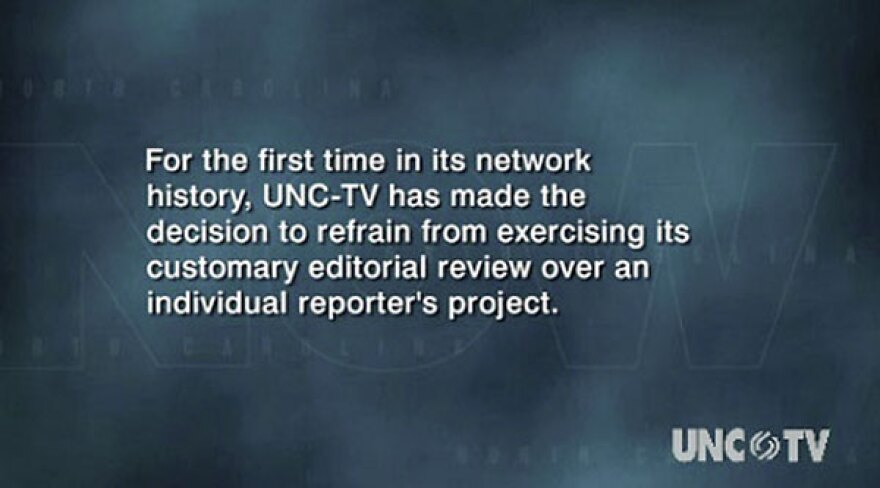http://66.225.205.104/GC20100726.mp3
As the North Carolina legislative session wound down this month, Senator Fletcher Hartsell of Concord demanded that public television station UNC-TV turn over all raw footage gathered for a series of stories on Alcoa and the Yadkin River. Alcoa is seeking renewal of a 50-year license to operate hydroelectric dams on the river. It wants to continue selling the electricity for a profit. Senator Hartsell opposes Alcoa's request. UNC-TV turned over 13 hours of raw footage. Station management decided it had to because it's part of a state agency. But that hasn't been the end of the story. There are several components to the controversy that's engulfed UNC-TV in the past month. UNC-Chapel Hill journalism professor Leroy Towns says they've all been damaging. "I think the credibility of UNC-TV has been severely damaged because of the way the station handled the original story and abdicated editorial oversight of it and because they very quickly overturned requested information to the Legislature." There was a lot of buildup to UNC-TV's three-part series about Alcoa and the Yadkin River. It was fresh off the controversial decision to give a Senate committee raw video before the stories aired. The committee's chairman, Senator Hartsell, played a rough cut of a documentary. What the public saw that same week on UNC-TV included portions of that documentary. It also included this disclaimer: "For the first time in its network history, UNC-TV has made the decision to refrain from exercising its customary editorial review over an individual reporter's project." It went on to say the station was doing so to alleviate any concerns over what it called "unfounded and untrue allegations" that UNC-TV management had tried to suppress the story. Towns says that was the worst of several bad decisions made by UNC-TV management. "Any news organization that airs or publishes something without taking responsibility for it is abdicating responsibility in news judgment, and those last 2 sections of series shows it Had some major holes." The reporter, Eszter Vajda, tries to connect Alcoa's working conditions and environmental problems to deaths and illnesses of workers. She ended the series with this conclusion: "Alcoa has benefited from the Yakin for 100 years and left behind undeniable environmental problems." Alcoa's environmental problems at its Stanly County aluminum smelter, which shut down in 2002, are the subject of debate and concern. But professor Towns says the series represents advocacy more than journalism. He served on a three-member committee of journalism professors that UNC-TV commissioned to review the stories. The committee didn't finish its report. Towns says station management decided it didn't want it; the station says it's just been postponed. Alcoa has concerns, too. It's filed a Freedom of Information Act request for all footage related to Alcoa and the Yadkin River, plus all notes, records and communications going back to January of 2008. Alcoa argues it's entitled to all this using the same logic Senator Hartsell: UNC-TV is a public agency. "The stations admitted it wasn't subject to standard editorial review, which was a red flag to us," says Alcoa spokesman Mike Belwood. "The story contained a lot of information we just don't think was grounded in reality. We felt it was damaging to our reputation at a time the government in North Carolina is trying to take our property. From our perspective, we needed to find out what's going on." The last month has turned into a "damn mess," Jim Goodmon says. Goodmon is president and CEO of Capitol Broadcasting in Raleigh, which owns WRAL-TV. That's a commercial station, but he's a huge fan of public broadcasting. He's served on the board of UNC-TV and has helped raise money for the station. He's also a big supporter of station management, but he thinks it made a big mistake in giving lawmakers video that hadn't been broadcast. He says that's where problems started. "My view was no way. Suppose UNC is doing a story on a legislator. Can't just call up and get footage. That'll never work. Has to do with long-term creditability of what we're doing." Goodmon says he urged UNC-TV to invoke the state's shield law, which is supposed to protect journalists from giving up sources so that they don't become investigative tools of the government. Even if a judge ruled the shield law doesn't apply to journalists at a government agency, Goodmon says the station would have gained credibility with the public in fighting the legislative demand. UNC-TV has not responded to Alcoa's request. Station management would not agree to an interview about what's happened since it turned over footage to lawmakers. But the reporter did. Ezster Vajda says the legislative subpoena took her by surprise. "At the end of the day, I think it hindered my journalistic effort on this story." Vajda says only the first of the three-part series was ready when she was subpoenaed. She says UNC-TV then rushed her to finish the series to air the following week. She also thinks that UNC-TV's disclaimer had the effect of discrediting her work. Still, she says people continue to send her tips about Alcoa. "This is really the reason I became a journalist. I became a journalist to get the dust out from under the rug and allowing people to make up their own minds." But she says she won't be doing anymore stories on Alcoa for UNC-TV. "UNC-TV's position is the Alcoa story is over." So Vajda says she'll just pass on the tips to other reporters outside the station.

